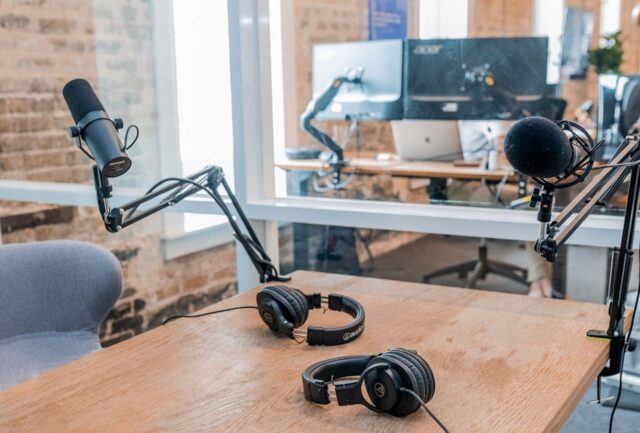
Podcasts are huge right now, and many podcasts have boomed over the COVID 19 pandemic with more and more people at home looking for some new entertainment. If you have stories to tell, ideas to share, or people to interview, starting a podcast might be an idea that has crossed your mind. Starting a podcast is now easier than ever – you don’t need a huge amount of equipment, you can find studios that can easily be hired for recording, and you can easily upload your podcast to popular platforms like Apple Podcasts and Spotify. Here are three of the main reasons to consider starting a podcast, and how to get your new podcast off the ground.

1. Podcasts are Growing in Popularity:
Over the past ten years, research has found that podcasts are becoming more and more popular in America. In 2018, monthly podcast listeners increased by 26% of the population, and the number has been rising year on year ever since. Millions of people across America tune into at least one podcast episode per month, so the more podcasts that are out there to suit the diverse interests of the listeners, the better. Podcasting has still not yet seen the downturn that most other entertainment forms will suffer from at some point, and there is a huge untapped market to reach.

2. Podcasts are Reaching Influential Generations:
The Baby Boomers and the Silent Generation are now making up a minority of the population in the US, with numbers of Gen X, Millennials, and Gen Z on the rise. And these generations are not as interested in reading as the ones before them. For the most part online, writing is being used for search engine optimization and marketing purchases, while video and audio tend to be the top choices for actual engagement. As a result, the future of podcasts is looking brighter than ever. Podcasting is growing in popularity with the younger generations in particular, with 25% of young people who listen to podcasts on a regular basis reporting that they are listening more.

3. Podcast Listeners Want Variety:
Podcast listeners don’t tend to just stick with one show. Once they have found some podcasts they like, many are often hooked and want to continue searching for other shows that match their interests. As a result, there is always a growing market for new and diverse podcasts to enter. People who listen to podcasts tend to follow an average of seven different shows at a time, and the number of shows that people are listening to is growing.

How to Get Your Podcast off the Ground
With the growing popularity of podcasts in America today, there are definitely plenty of reasons to consider starting one of your own. To learn how to start your own podcast for free, visit https://melonapp.com/how-to-start-a-podcast/.
However, coming up with a podcast idea, publishing it, and producing it is just half of the work required. In order to get your podcast off the ground and attract listeners, you’ll need to have a solid plan in place for promotion and more. Promoting your podcast and making sure that it’s appealing to listeners and stands out from the competition is key.

1. Hire a Professional Recording Studio:
Getting the sound quality right when recording your podcast is absolutely essential. Today, there are so many well-recorded podcasts out there that most listeners are going to tune out very quickly if they put on a show that has subpar sound. A bad-quality mic or a lot of background noise can seriously bring an otherwise great podcast down and put listeners off from tuning in. Find out more about how to start a podcast using the professional studios offered by Pirate.com. They offer 24/7 access, fully equipped podcast studios in various locations across the US. The studios offer room for seating up to four people, making them ideal for those interview podcasts too.

2. Be Consistent:
Despite the growing popularity of podcasts, it is actually quite rare for a podcast to get a large audience after just one episode. One tip for getting your podcast off the ground to keep in mind is that it can take months or even years to build your audience. It is important to understand that in order to create a successful podcast, you will need to be ready for showing up consistently. For this reason, it’s important to choose a podcast topic or idea that you actually enjoy and are passionate about – after all, if you don’t enjoy it, it’s going to be hard for people to enjoy listening to you.

3. Get Audience Feedback:
Over time, it is important to check in with your audience on a regular basis and get feedback from them that you can use to make improvements over time. Often, getting audience feedback and taking what listeners have got to say into account is the main difference between a podcast that survives and a podcast that thrives. However, it’s important to bear in mind that right at the beginning of starting your podcast, any listeners are unlikely to have fully bought into your podcast yet and your audience won’t be fully established.
With each episode that they listen to, they will be in the process of weighing up whether or not to continue listening, which is why it’s important to tell the audience exactly what the show is about, how it works, any plans for the future that you have, and what they will get from listening.
Asking for feedback right at the beginning could make it look as if your show is lacking direction, so it’s important to do your research into what your target audience wants and start asking for feedback as your show becomes more established and begins to grow a listener base over time. Listeners who buy into what you are offering will become your core audience and over time, you will be able to get them involved in shaping the show.
Today, more people than ever before are listening to podcasts. Whatever you’d like to talk about, starting your own podcast is a great hobby or business idea, and it’s easier than ever.









